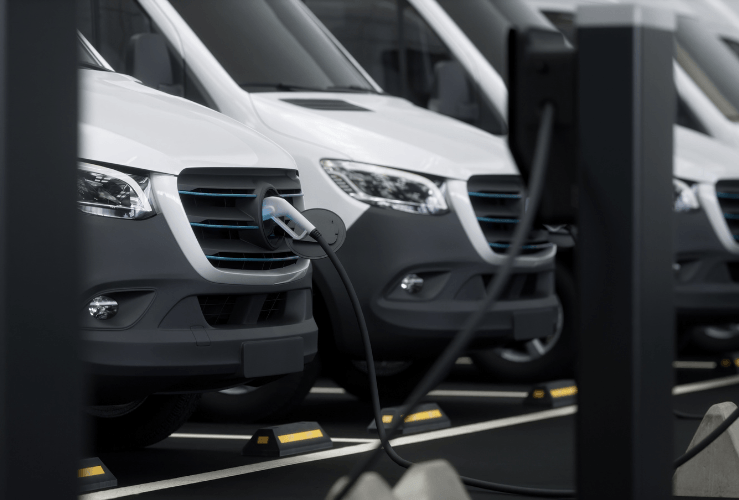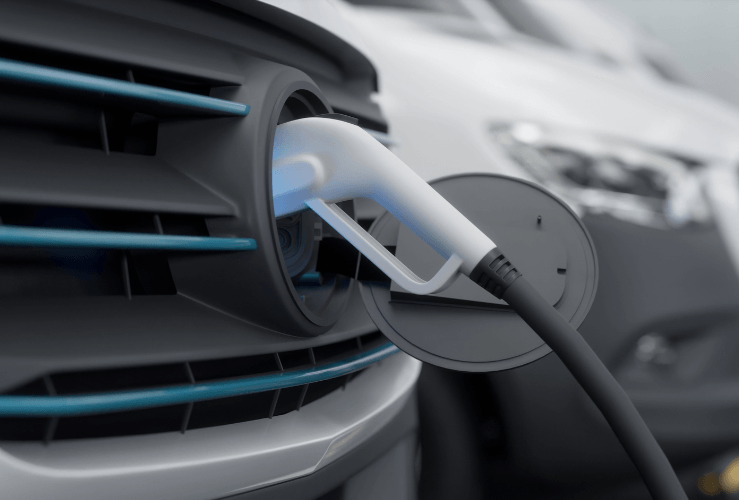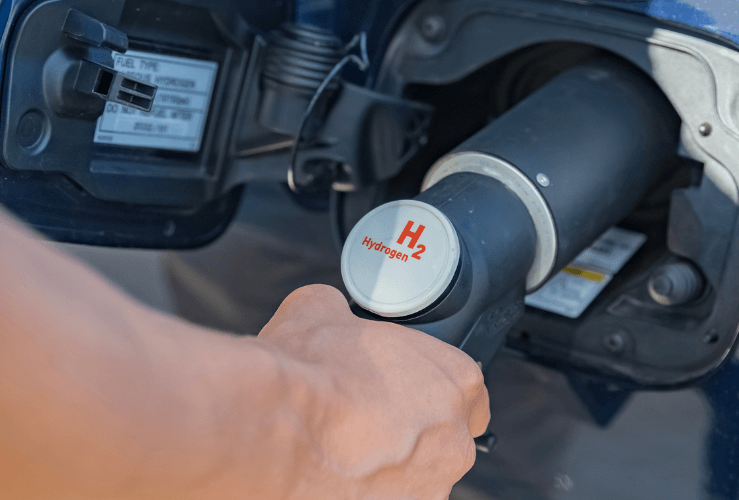Is now the right time to transition your commercial fleet to electric? Here are the pros and cons of making the switch…
Whether you're a company with HGVs transporting food nationwide, a delivery firm running medium-sized vans, or a large cab outfit operating dozens of vehicles, there's no denying that electric vehicles are your future (whether you like it or not!).
Sales of new petrol and diesel cars and vans are set to be banned by 2035 (delayed by five years due to the cost of living crisis), while new combustion engine HGVs will not be sold after 2040.
The government has targeted petrol and diesel vehicles because they represent a large proportion of the UK's carbon emissions. This is especially true for larger delivery vehicles. For example, despite accounting for just 1% of vehicles on the road, HGVs are responsible for 19% of UK transport emissions.
But while we all know that the combustion engine is polluting and that it has been condemned by government legislation, it's still important to understand the pros and cons of transitioning your fleet to electric.
Pros of EV's for businesses
Going electric could be the cornerstone of your CSR policy
Having a solid corporate social responsibility policy has become the norm for many companies. In fact, 90% of multinational companies "engage in CSR activities", while 25% of assets under management are invested based on CSR strategies - so going green has become increasingly important for attracting investment.
Replacing your diesel fleet with a cleaner alternative such as EV, hybrid, or hydrogen, could be a headline-grabbing way to publicise your corporate social responsibility efforts.
Electric HGV ranges are increasing all the time
Nothing stays still in the age of the EV - and that includes electric heavy goods vehicles. For instance, German truck giant MAN claims its eTruck will soon be able to cover up to 800 km per day, with charging breaks of around 45 minutes. And the company states that ranges of up to 1,000 km are within reach.
At present, however, MAN says its eTrucks can cover between 300 and 450 km per charge, depending on the vehicle type.

Lower running costs
An often-touted benefit of switching to an electric fleet is the lower running costs - because electricity is cheaper than diesel or petrol (at least at this point in time).
Additionally, EVs have lower maintenance costs compared to their combustion engine counterparts. This is because there are far fewer moving parts in an EV; fewer parts mean less maintenance downtime - a big factor for busy fleets.
End-to-end charging solutions are available
Installing charge points can be a daunting prospect - especially if your company operates at multiple depots with scores of vehicles arriving and departing at any one time.
Thankfully, a number of providers offer end-to-end solutions for getting these set up. Companies like Virta, for example, analyse the would-be charger locations, select suitable chargers, then install them along with any other hardware and IT systems required. This can take away a lot of the stress (if not the cost!).
Acting sooner makes sense given government targets
The days of the combustion engine are numbered. The UK government has stated that new petrol and diesel-powered HGVs won't be sold beyond 2040, while new combustion engine cars and vans won’t be on sale beyond 2035. With this in mind, there’s sense in making the switch in a timely manner.
However, with 16 years to go for HGVs and 11 for cars and vans, companies will need to be headed by people with long-termist economic views.

Cons of going electric
Lack of charge points for HGVs
While the UK's network of charge points for cars and vans is expanding, provision for HGVs is still lacking.
HGVs require more parking space and higher power charging levels. There are also fewer suitable locations for HGV charge points. However, "depots, truck stops and motorway service areas" may be usable, according to the Mayor of London, who answered a London Assembly question on the topic.
Fleets will need to invest in depot charge points
In order to keep their EV fleets running, it's almost certain that big companies will need to invest in depot charge points. For firms with larger fleets, this could mean a lot of charge points to find money for.
At present, small and medium-sized companies can apply for up to 5 EV charge point grants across 5 different sites, which will cover 75% of the cost of the work.
Fleets will need to change the way they operate
For fleets that have used diesel vans and lorries since they were established, switching to electric will mean a lot of reorganising. Every vehicle route will need to factor in where and when charging will take place, and how this fits in with drivers' working hours, rest times etc. Further, this is likely to be an ongoing process as longer-range vehicles come online, meaning schedules will have to be regularly reorganised.
EV vehicles come with a high initial outlay
Electric vehicles are costly to design and develop - and that cost gets passed on to the buyer. The result is that EV cars, vans, and lorries are more expensive than their long-established combustion engine counterparts.
To make a positive impact, the technology needs to last
While EVs are purportedly greener alternatives to the combustion engine, several tonnes of manufacturing emissions are necessary to make each EV battery.
Based on this, it would take four years of driving a zero-emission EV car to balance out the emissions of a combustion engine car.
After this point, the EV is truly green - unless the battery fails soon after. In effect, batteries need to last the lifetime of the car - which is around 14 years - in order to make a positive impact on the environment. And of course, this requirement for a long battery life is the same in relation to vans and HGVs.
Questions remain over some technologies that are so new, no one really knows how long they'll last.

What about hydrogen?
Of course, electric is not the only powertrain in town. Hydrogen remains a possibility - although a faint one due to a lack of refuelling infrastructure.
There are a handful of hydrogen refuelling stations around the UK. However, in 2023 one major operator - Motive - closed two stations in Rainham and Teddington due to a lack of demand.
In conclusion
Those with large fleets will be keen to choose a switchover point where EVs cost less but have a longer range, and where the infrastructure has developed sufficiently to support wide EV usage. And for some firms, finding the requisite investment cash may be an issue - especially if large scale depot charge points are required, as well as new EVs.
It may be tempting to make the switch closer to the dates when combustion engine vehicles will be outlawed, but fleets and drivers need to ensure they have enough time to grow into the new technologies, schedules and work routines that will come with the EV revolution.
Looking for business breakdown cover?
At Start Rescue, we offer comprehensive business breakdown cover to keep your business vehicles on the road, whether you have a single van or a large commercial fleet. Enjoy reliable protection for cars, motorcycles, vans, and more, ensuring your business stays productive.



